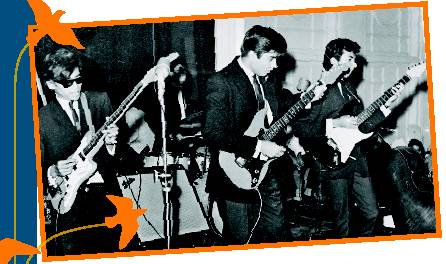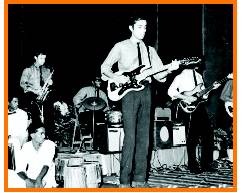Pop/ rock bands: India
You can send additional information, corrections and photographs on on their online archival encyclopædia only after its formal launch in late 2014 |
The times they were a-rockin’
India too had a beat generation back in the 1960s and ’70s, inspired by the rebellious mood in the West. To these bands goes the credit for pioneering India’s rock scene
Sidharth Bhatia
Contents |
The 1960s and ’70s: The context
The 1960s and ’70s were decades of great upheaval. World over, societies underwent massive change, moving away from conservatism to a more liberal order. Nuclear tension, the Vietnam War, women’s liberation, student riots — that period saw all this and more. And rock music. By the mid-’60s, the new generation, called the baby boomers, had begun to come of age and vociferously rejected everything their parents had believed in.
In India, the situation was similar, even if the concerns were far removed from those of the West. India’s first generation to be born after Independence, the so-called Midnight’s Children, entered their teens with no personal memory of the British Raj. India was not a rich country basking in post-war prosperity; it was poor and what is more, socialistic. This meant that it was, economically speaking, shut off from the rest of the world, in some ways literally. There were endemic shortages and government control. Ordinary consumer goods were not available. But the youngsters were not to be stopped. They were no less independent-minded than their counterparts in the rest of the world.
For me, this period in India’s history is fascinating. During those decades, we faced no less than three wars, saw the early stirrings of far-Left violence, begged around the world for food and suffered under Emergency. But there was also music. And in music lay a story.
The young urban Indian of the time looked westwards for ideas and was deeply inspired by the new sounds coming from there. Despite the fact that Indian radio, tightly controlled by the government, did not play western music, (and in the early years, even popular filmi music), young kids tuned to stations broadcasting on short wave. Radio Ceylon, BBC, Voice of America — radio dials were turned to these broadcasters and the music that wafted in was new. In many a home in Bombay, Bangalore, Calcutta, Madras, Delhi and elsewhere, the kids had heard jazz and singers like Frank Sinatra and Nat King Cole. They found this fuddy duddy. When the first Beatles single Love Me Do was released in October 1962, it struck a new chord with youngsters all over the world. Then came the Rolling Stones (and later, Led Zeppelin, Bob Dylan and Jimi Hendrix) and teenagers were entranced. They wanted to immediately pick up a guitar and start making music like that. But guitars were not easy to get — duties on imports of musical instrument were high.
So they went ahead and got local technicians to make guitars. For amps they used public address systems. Drums they got from local police bands. And when they found shops did not stock records of the latest music, they just banked on friends and cousins coming from abroad. Under these circumstances was India’s rock revolution born.
Scores, if not hundreds of music groups sprung up, playing cover versions and their own original music. They played wherever they could — in restaurants, concert halls, nightclubs, discos. They were paid niggardly amounts. Most were either still college students or had day jobs to make a living. Recording companies were not particularly interested in them, which is why there are so few LPs and singles from the time, and the rockers themselves wanted to stay away from the film business. Yet, they thrived and became hugely popular, and some of them became “brands” that are recalled even today. Names such as the Mustangs, the Savages, Human Bondage, the Combustibles, Brief Encounter, Great Bear and Atomic Forest have a resonance among those who grew up during the time and now are much older (though still rocking.)
Compared to Hindi cinema music, India’s rock scene, which lasted for over a decade, was small, confined to the westernized youth in the cities and on college campuses. But it is a metaphor for a certain spirit of independence and
freedom. Not only was the music new, but even social attitudes changed and the new Indian teenager — itself a product of the times — shed older values and attitudes.
Generation Gap became the mantra of the time. The long hair, the bellbottoms, the student marches – even, unfortunately, the drugs — were all symbolic of wanting to strike out on their own and be as different as possible from the previous generation. “Down with God, Country, Parents — Everything” was the headline of a cover story in the Illustrated Weekly of India about youth attitudes, with a photo of a rock band. The times, they were rocking. And rock music was the soundtrack of those psychedelic times.
Setting out to write about that generation, I found that most musicians and others I interviewed were modest about themselves and their bands. “We did what we did because we enjoyed it — nothing more,” was the common refrain. But there was unquestionably a little pride in having done it in very difficult circumstances, with obstacles that would be ridiculous today. (Turning a valve radio into an amp? A musician today would just laugh.) And the spirit is still there — in Vancouver, or New York or Goa or Calcutta, wherever they live (and tracking them down was not easy) many a musician of those times is still banging those drums and strumming that guitar and still belting out “Satisfaction” or “I want to hold your hand” or “Immigrant Song” at the top of his voice. Once a rocker, always a rocker.
BEAT B OYS
TROJANS
Probably the fi rst beat group to be formed in India. Four Bangalore boys get together, fashion their hair and clothes like those other four from Liverpool and strut their stuff in Bangalore, Calcutta and Bombay. One of them goes on to produce hit records in London—his name, Biddu.
MUSTANGS
Madras was abuzz with bands, the main competition being between students of Madras Christian College and Loyola. The Mustangs mainly played instrumental numbers and were among the early ones to cut a single. Their reunions draw a nostalgic crowd even today.
JETS
Bombay’s first band, which won so many fans that when it fi nally decided to break up, the farewell concert drew hundreds of fans. This group introduced the Fender Stratocaster to India, which changed their sound, even if three guitarists had to plug into one amplifi er.
[OF] HUMAN BONDAGE
Widely considered by their peers as the best and tightest rock group. They never cut a record, but their raga-infused performances all over the country, especially Delhi, where they played in popular discos like Cellars and Wheels, are still remembered.
GREAT BEAR/HIGH
Calcutta’s pride, a band that has a cult following till this day. Known not just for rock music but also originals, which included an opera based on Tolkien’s Lord of the Rings.
ATOMIC FOREST
Funk, Psychedelia and much more. Their one album Obsession 77 is a collector’s item and their troubled history has added more colour to their already formidable reputation.
This is a very brief list. It does not include groups like Raja Andrews and the Nawabs, who were said to be the first English-language pop group in India to cut a disc (with HMV). Biddu Appaiah, with his superhit Look out here I come /Daughter of darkness deserves an entire article for his music within India (not to mention his world-beating music from London). Then there were Indian hits like I married a female wrestler, Oh Yogi and Bombay meri hai (English), plus much by Usha (Sami/ Iyer/ Uthup). The film Bombay Talkie had two English language hits (Good Times… and Hari Om Tat Sat) by Shankar Jaikishan. Then there were Susmit Bose, Ajit Singh...
Readers can send additional information to the Facebook page, Indpaedia.com

